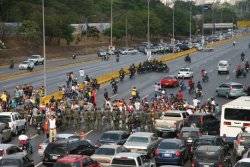Violence over Venezuela's disputed presidential election has left seven people dead and dozens more injured, according to state news agency AVN.
The country remained on edge on Tuesday as Nicolas Maduro, the president-elect, accused the opposition of orchestrating a coup and banned protests against results of Sunday's election.
Henrique Capriles, the opposition candidate who has repeatedly demanded a recount, responded on his Twitter account, blaming Maduro and his government for the violence.
"The illegitimate one and his government ordered that there be violence to avoid a vote count! They are the ones responsible," he said.
Capriles called off a march by his supporters in Caracas planned for Wednesday, saying on Tuesday that his rivals were plotting to "infiltrate" the rally to trigger violence.
Capriles had planned a peaceful march to the offices of the electoral authority to present the opposition's demands for a full vote recount.
In a separate development, the country's chief prosecutor announced an investigation into the post-election violence.
Al Jazeera's Teresa Bo, reporting from Caracas on Tuesday, said Capriles' supporters were alleging "vote fraud".
"The situation seems to be getting more tense by the minute," she said.
Student protests
National Guard troops fired tear gas and plastic bullets on Monday to disperse students protesting against the official results as Maduro - the handpicked successor of late President Hugo Chavez - was formally declared the winner.
The students hurled chunks of concrete and stones back at the troops on a highway in Caracas.
The demonstrators tried to reach the western part of the Venezuelan capital, where most of the government is headquartered.
Capriles had unsuccessfully called on the National Electoral Council - dominated by Chavistas - to suspend plans to officially proclaim Maduro as the winner of the election.
Capriles had urged Venezuelans to bang their kitchen pans if the proclamation on Monday went forward - a popular Latin American form of protest known as a cacerolazo - to "let the world know our outrage, our anger".
Following his confirmation, Maduro urged his supporters to demonstrate across the nation on the same days that the opposition planned further protests.
"I continue calling for peace, and I call the people to combat in peace," Maduro said on state-run television, calling for "mobilizations across the country" on Tuesday and Wednesday.
'Power of the majority'
The National Electoral Council said late on Sunday that Maduro had won 50.66 percent of the vote compared to 49.07 percent for Capriles - a difference of less than 300,000 ballots - allowing him to carry forward the policies of the late Hugo Chavez.
Venezuela uses electronic voting machines that print a paper ballot as a back-up for any recounts.
"There should be no doubts about the election results," Maduro said addressing a crowd from the Miraflores presidential palace.
"The institutions are functioning. If 7,500,000 Venezuelans said that Nicolas Maduro should be the president of the republic until 2019, this must be respected - the democracy and the power of the majority."
Maduro, however, said he would welcome an audit. "We are calling for respect of the results," he said.
"If they want do an audit they are welcome to do it. They can do whatever audit they want to do. We trust in the Venezuelan electoral system. We welcome an audit."
Capriles said there were attempts to let people vote after polling stations had already closed.
Hugo Chavez named Maduro, a former bus driver and union activist who rose to foreign minister and vice president, as his political heir in December before undergoing a final round of cancer surgery.
Chavez died on March 5 aged 58.
PHOTO CAPTION
Opposition supporters partially block a main road in Caracas as they demand a recount of the close election.
Aljazeera


 Home
Home Discover Islam
Discover Islam Quran Recitations
Quran Recitations Lectures
Lectures
 Fatwa
Fatwa Articles
Articles Fiqh
Fiqh E-Books
E-Books Boys & Girls
Boys & Girls  Hajj Rulings
Hajj Rulings Hajj Fatwas
Hajj Fatwas














